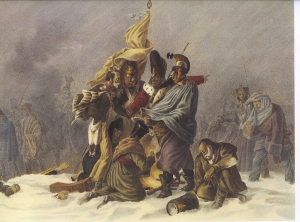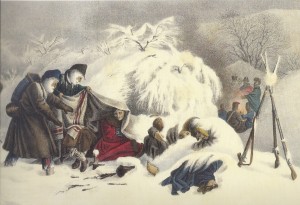Faber du Faur painted two scenes dated November 7. Both dedicated to showing the effects the recent snow had upon the army.
Between Dorogobouye and Mikalevka, 7 November
“The order had been given for us to turn off the Kaluga road and make our way to the Smolensk-Moscow road. Until that point, despite the numerous difficulties we had encountered along near impassable roads – difficulties that often led to losses of men, horses and caissons – we had, at least, always managed to find some food. We had, too, always marched as a disciplined body and had not lost a gun, despite fighting in some particularly bloody engagements. But now we found ourselves in a land already stripped by both ourselves and our enemies.”
“Even so, we still hoped to reach Smolensk before the furies of winter fell upon us – Smolensk, where we would find well-stocked magazines and shelter, where Victor and his corps, placed in reserve, would bid us a warm welcome. Therefore, led by our hope, we traversed the field of Borodino, marched through Gjatsk and, on the 3rd, pushed through the Russians at Viasma. However, on the 5th and 6th the sky grew overcast and there were occasional flurries of snow. On the 7th a massive snowstorm robbed us of the day and announced the true arrival of the Russian winter. We struggled forward, unsure of where we were or who surrounded us. The furious storm blew huge flakes of ice into our faces – flakes which soon settled and sought to obstruct our march. The horses found the going difficult on the icy surface and gave up Convoys and, for the first time, cannon were abandoned. The road began to be littered with frozen bodies, and these, soon covered with a snowy winding sheet, formed small mounds. This was all that was to remain of so many of our comrades-in-arms.”
“The Russian winter finished off what the starvation, exhaustion and retreat had been unable to accomplish. The army disbanded and melted away. Now it resembled a rabble – men of all arms, of all army corps, marching in small bands or alone. They had not deliberately abandoned their flags, but cold and an instinct for self-preservation made men quit their units. Continuing the march was a terrible effort every single day; for the gunners it was especially tough as they tried to look after their horses and save their guns. The most terrible part, though, was the night – sixteen hours of darkness, camped in the snow, without food, without a fire. The first such winter camp was that at Mikalevka, on the night of the 7th.”
Camp Near Mikalevka, 7 November
The fatal retreat had begun. The ancient city of the Czars was nothing but a heap of smouldering rubble and eyes had turned westwards towards far-off homelands. Whilst the sky had been serene and our feet trod upon firm earth, all had gone well. Our thin garments had protected us from autumnal breezes, we found food in villages, and the soldiers, even when suffering, had hope of better things to come. But the sky clouded over, the snow fell and the icy North came down upon us with all its attendant furies. The road disappeared and, for as far as one could see, a sheet of white stretched to the horizon. The faithful gunners made incredible efforts to save their pieces; they buried those they could no longer drag with them.”
“After a day in which we had suffered as never before, we reached a village and came across some snow-covered huts. Some of our comrades had preceded us and sought out shelter for us. But all was quiet and we assumed they had now abandoned the huts and resumed their march. As we drew nearer, however, we came across corpses frozen stiff and saw in their fate our own destiny. We sought to brace ourselves for all the future could hurl against us, but the sinister end to the first day of winter marked but the start of our woe.”
Source:
With Napoleon in Russia: The Illustrated Memoirs of Major Faber du Faur, 1812, Edited by Jonathan North



